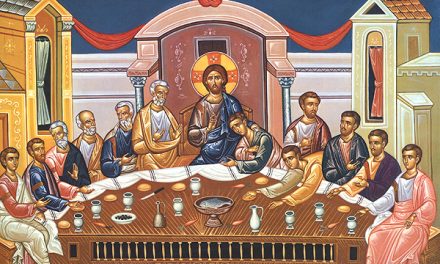2 Kgs 4:42-44
Ps 145:10-11, 15-16, 17-18
Eph 4:1-6
Jn 6:1-15
Over the past two weeks, the lectionary posts have been toying with the complex dynamic between grace and human action. It is this dynamic that makes moral theology such an interesting (and difficult!) field to work in. On the one hand, moral theology is about ethics, about human actions and human happiness. On the other hand, moral theology is theology and the recognition that God is sovereign and the ultimate end of human life and true happiness is a goal unattainable through human actions alone.
Our need for God’s help is always and everywhere present. Human action alone just cannot provide enough comfort to those in pain, enough assistance to those in need, enough care to to those suffering. As an example, a little over a year ago, the United Nations declared a famine in Somalia. Although conditions are improving, an estimated 2.51 million people are still in urgent need. Although the country is not technically in a famine state anymore (which means that more than 2 people per every 10,000 die per day) many are still dying from lack of food. The state on the ground in Somalia has been complicated by drought and the presence of the militant group Al-Shabaab which had denied direct access to humanitarian groups in parts of the country under its control. Elsewhere in Niger, Mali, Mauritania, Chad, Senegal, and parts of Nigeria and Gambia, more that 18 million people don’t have enough to eat.
When I read about the famine-like conditions in parts of Somalia and in the Sahal region, I often feel a nagging sense of despair. What can I do? During the peak of the famine, Nicholas Kristof wrote about ways to donate to various organizations helping victims on the ground. Such donations are incredibly important, but they still don’t solve the problem that aid, no matter how plentiful, is not getting to so many in the Shabab-controlled areas of Somalia. It is easy to feel hopeless. No matter what we do, no matter how noble our efforts, we simply cannot fix the problem. Thousands of Somalis and millions of other Africans are still suffering and dying.
The readings for this week challenge our despair. “The hand of the Lord feeds us,” the Psalmist reminds us. “He answers all our needs.” Our Gospel reading is the feeding of the multitude, Jesus’ miraculous multiplication of loaves and fishes that shows up in all four gospels. Jesus sees a needy crowd and all the food there is to feed them is a little boy’s contribution of five barley loaves and two fish. Philip despairs, “Two hundred days wages worth of food would not be enough for each of them to have a little.” Andrew, looking at the meager loaves and fish, shares Philip’s hopelessness. “What good are these for so many?” But Jesus calmly thanks the Father for the food they have and distributes it to the hungry crowd. Not only is there enough to feed everyone, there are leftovers!
There are some interpretations of this story that argue that the members of the crowd were hiding food under their clothes, and that seeing the generosity of the boy, they are ashamed at their stinginess. As the baskets of bread and fish go by, they contribute from their own supply. At first reluctantly generous, the crowd sees that there is more than enough for everyone. I think this is a bad interpretation of the story and reinforces our assumptions that if humans were just good enough, we could solve our own problems. The crowd here is in need. There really isn’t enough to feed everyone. But there is something. The little boy gives up everything he has, and Jesus does a miracle. He makes that little bit more than enough.
When we see something like the famine in Somalia, we do wrong if we despair and do nothing, knowing that our meager human actions cannot meet the needs of those who suffer. It is true, even if we in the United States donated billions of our own money, people would still likely die of starvation in the Shabab-controlled areas. But our own meager efforts are absolutely necessary. We should donate money to groups working on the ground (since most of us can’t really fly over to Somalia and help out ourselves). From our own resources, we should give generously.
But we should also recognize our human limitations. We should pray. We should pray for God’s grace to break into our human tragedy to comfort, heal, and nourish. We should have faith and hope that He can transform our meager efforts and make them not only sufficient, but more than abundant. We need to navigate that fine line between knowing that we can’t do it all on our own so not doing anything at all, and assuming that if we were just generous enough the problem would be solved.
I encourage readers of this blog to help. Send funds to Catholic Relief Services, my pet organization, or another organization to help relieve those suffering in the Sahel and in Somalia. Send a lot if you can, and encourage your friends and family to do the same. But as Christians, let us also be reminded from the lectionary this week that “the hands of the Lord feeds us; he answers all our needs.”



We don’t need to convince ourselves that we can, with the God’s help, solve all the world’s problems. All we must do is to recognize the unreasonableness of refusing to fix what we can on the grounds that we cannot fix everything.